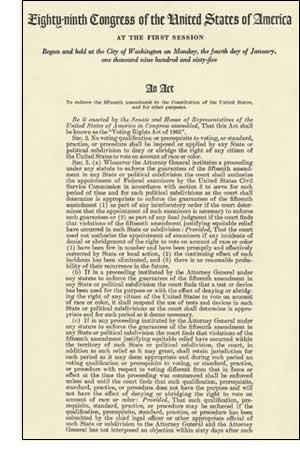Safeguards intact
Supreme Court narrows, but preserves, Voting Rights Act
 In a unanimous decision, justices leave safeguards intact while allowing municipalities with a clean record to 'bail out.'
In a unanimous decision, justices leave safeguards intact while allowing municipalities with a clean record to 'bail out.'
The Supreme Court narrowed, but did not overturn, the historic Voting Rights Act today, ruling that municipalities across the South that have had a clean record for the last decade can seek an exemption from the law.
The decision came as a relief to civil rights advocates, who feared the high court was prepared to invalidate the law.
Since 1965, the Voting Rights Act has required states and municipalities in the South to "pre-clear" any changes in their voting or election standards with the Justice Department in Washington.
Three years ago, Congress extended this provision for another 25 years, but it was challenged by a small Texas water district as unfair and outdated.
The case had set the stage for a potentially broad ruling by the high court's conservative bloc.
But in the end the court produced a unanimous ruling that preserves the law, but narrows its effect.
States across the South from the Carolinas to Texas will remain subject to the law and its Section 5, the provision that requires voting changes to be cleared in advance.
But counties, cities and school districts can now go to court and ask to "bail out" of the law. To win an exemption, the municipality must have had a clean record for the last decade, with no finding that they had restricted voting rights during that time.
"Things have changed in the South," said Chief Justice John G. Roberts Jr. in announcing the decision. Blacks now register and vote in the same percentages as whites, he said.
"These improvements are no doubt due in significant part to the Voting Rights Act itself and stand as a monument to its success," he said.
"Past success alone, however, is not adequate justification to retain the pre-clearance requirements," he added.
Today's decision could also affect some municipalities in California, New York and Arizona. They were brought under the law in the 1970s because they had a high percentage of non-English-speaking residents.
Justice Clarence Thomas agreed with the ruling, but said he would have gone further and struck down Section 5 of the act as unconstitutional.
Civil rights groups praised the decision.
"This is a Pyrrhic victory for those who were behind bringing this case," said Jon Greenbaum, legal director for the Lawyers' Committee for Civil Rights Under Law. "We are glad that Section 5 of the Voting Rights Act remains intact to protect the rights of voters."
(Published by LA Times - June 22, 2009)